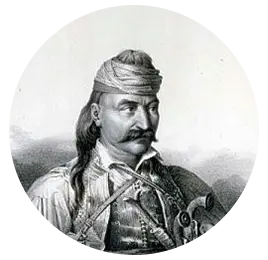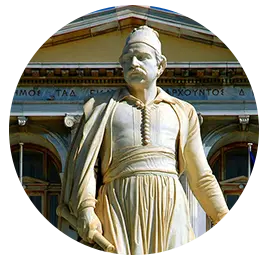What do we celebrate on March 25th?
March 25th is celebrated as Greek Independence Day. This day commemorates the start of the Greek War of Independence in 1821, which ultimately led to Greece gaining independence from the Ottoman Empire since the fall of Constantinople in 1453. It is one of the most significant national holidays in Greece and is marked with various festivities, parades, and cultural events across the country.
Date to remember: March 25, 1821
Fought against: Ottoman Empire
https://en.wikipedia.org/wiki/Greek_War_of_Independence
Who are the most important individuals of the Greek war of independence?
The Greek War of Independence (1821-1832) featured several prominent heroes who played crucial roles in the struggle for Greek independence. Here are some of the most important ones:

1. Theodoros Kolokotronis: Known as the “Old Man of the Morea,” Kolokotronis was a skilled military leader and one of the key figures in the Greek War of Independence. He led forces in numerous battles and played a significant role in the victories against the Ottoman Empire. Kolokotronis was renowned for his bravery, strategic prowess, and leadership abilities, making him a revered hero in Greek history.

2. Athanasios Diakos: Diakos was a Greek military commander and one of the early leaders of the revolution. He fought in several battles against the Ottomans and became a symbol of courage and resistance. Diakos is remembered for his valor and determination, particularly during his last stand at the Battle of Alamana in 1821, where he chose to face death rather than surrender.

3. Laskarina Bouboulina: Bouboulina was a Greek naval commander and one of the few female leaders of the Greek War of Independence. She used her wealth and influence to fund and equip ships for the Greek navy, playing a vital role in the naval warfare against the Ottomans. Bouboulina’s bravery and determination in battle earned her respect and admiration, making her a symbol of female empowerment in Greek history.

4. Andreas Miaoulis: Miaoulis was a Greek admiral and naval hero who played a crucial role in the Greek War of Independence. He commanded the Greek fleet and achieved significant victories against the Ottoman navy, including the Battle of Navarino in 1827. Miaoulis’ strategic brilliance and leadership skills were instrumental in securing Greek independence and establishing Greece as a maritime power in the Mediterranean.
These heroes, along with many others, played essential roles in the Greek War of Independence, inspiring future generations with their courage, sacrifice, and commitment to freedom.
Events overview:
The Greek War of Independence, also known as the Greek Revolution or the Greek Revolution of 1821, was a successful war of independence by Greek revolutionaries against the Ottoman Empire between 1821 and 18291. Here’s a concise timeline of key events during this pivotal period:
- February 21, 1821: Revolt Declared
- Alexandros Ypsilantis declared the Greek War of Independence from the Ottoman Empire in Wallachia (Iaşi).
- This marked the official beginning of the struggle for Greek freedom.
- March 25, 1821: Flag Blessing and Proclamation
- According to tradition, Metropolitan Germanos of Patras blessed a large Greek flag at the Monastery of Agia Lavra in Peloponnesus.
- He proclaimed to the assembled people the start of the Greek Revolution.
- 1821–1829: Key Milestones
- September 1821: Greeks, led by Theodoros Kolokotronis, captured Tripolitsa.
- Crete, Macedonia, and Central Greece witnessed revolts but were eventually suppressed.
- Greek fleets achieved success against the Ottoman navy in the Aegean Sea, preventing reinforcements from arriving by sea.
- The struggle spanned centuries of subjection under Ottoman rule and culminated in the late 18th century with a cultural Greek enlightenment that drew Europe’s attention and support2.
- Greek Victory and Independence:
- The war resulted in Greek victory and the establishment of the First Hellenic Republic (1822–1832).
- It also marked the start of the Russo-Turkish War (1828–1829).
- Diplomatic agreements, including the London Protocol and the Treaty of Constantinople, paved the way for the establishment of the Kingdom of Greece in 1832.
- The Ottoman Empire officially recognized Greece’s independence.
The Greek War of Independence remains a testament to courage, resilience, and the enduring spirit of freedom.
Learn more:
The Greek Revolution (1821-1829) Through American Eyes
United States and the Greek War of Independence (Greek Prime Minister Kyriakos Mitsotakis discussed American influences on the Greek War for Independence while recognizing the 200th anniversary of the war).
What do we celebrate on October 28?
Date to remember: October 28, 1940
Fought against? Fascist Italy and then Nazi Germany, the European Axis powers during World War II
On October 28th, Greece celebrates Ohi Day, also known as “Oxi Day” or “Anniversary of the NO”. This day commemorates Greece’s refusal to surrender to the Axis powers during World War II. On October 28, 1940, Greek Prime Minister Ioannis Metaxas famously rejected an ultimatum from Italian dictator Benito Mussolini demanding free passage for Axis forces to enter and occupy Greek territory. Metaxas replied with a single word: “Ohi” (No). This act of defiance marked Greece’s entry into World War II on the side of the Allies and is celebrated annually as a national holiday in Greece. “Ohi” [ Όχι ] Day is honored with parades, ceremonies, and other patriotic events across the country.
https://en.wikipedia.org/wiki/Ohi_Day
Several important figures are associated with Greece’s Ohi Day event, each playing a significant role in the country’s history. Here are a few of them:
1. Ioannis Metaxas: As the Prime Minister of Greece during World War II, Metaxas is perhaps the most prominent figure associated with Ohi Day. His famous response of “Ohi” (No) to Mussolini’s ultimatum on October 28, 1940, symbolized Greece’s refusal to surrender to Axis forces and its commitment to defending its sovereignty.
2. King George II: King George II of Greece reigned during the tumultuous period of World War II. While his role was largely ceremonial, his symbolic support for Metaxas and the Greek resistance against Axis aggression helped galvanize national unity and morale during a critical time.
3. The Greek People: Beyond individual figures, the Greek people themselves are central to the narrative of Ohi Day. It was their collective spirit of resistance, determination, and sacrifice that ultimately thwarted Axis attempts to conquer Greece. Ohi Day serves as a reminder of the bravery and resilience of the Greek populace in the face of adversity.
These figures, along with countless others in the Greek military, government, and civilian population, contributed to the historical significance of Ohi Day as a symbol of national pride and resistance against tyranny.
Events Overview:
The German invasion of Greece, also known as the Battle of Greece or Operation Marita, occurred during World War II. Let’s delve into the key events and consequences of this pivotal period:
- Background:
- In October 1940, Fascist Italy invaded Greece, initiating the Greco-Italian War.
- The Greek forces, with British support, repelled the initial Italian attack and even launched a counter-offensive in March 1941.
- German Blitzkrieg Campaign:
- On April 6, 1941, Nazi Germany intervened on Italy’s behalf.
- German troops invaded Greece from Bulgaria, creating a second front.
- The Greek Army, already stretched thin defending against both Italian and German forces, found itself outnumbered.
- The Metaxas defensive line was quickly overrun, leading to the surrender of Greek forces at the Albanian border.
- Occupation:
- The entirety of Greece was occupied by the Axis Powers starting in June 1941.
- An Axis collaborationist government replaced the Greek government.
- Greece’s territory was divided into occupation zones:
- Germany administered key regions, including Athens, Thessaloniki, and strategic Aegean Islands.
- Italy and Bulgaria controlled other parts of the country.
- Consequences:
- The occupation brought terrible hardships for the Greek civilian population:
- Economic Ruin: 80% of industry, 28% of infrastructure, 90% of bridges, and 25% of forests were destroyed.
- Civilian Deaths: An estimated 7-11% of Greece’s population died due to the occupation.
- Athens Suffering: 40,000 civilians died from starvation, and many more faced reprisals by Nazis and collaborators.
- Jewish Population: Greece’s Jewish population was nearly eradicated.
- Resistance: Despite the hardships, Greece formed one of the most effective resistance movements in occupied Europe.
- Liberation: The occupation lasted until October 1944, when Germany and Bulgaria withdrew under Allied pressure. Crete and other Aegean islands were surrendered to the Allies in May and June 1945 after World War II in Europe ended.
- The occupation brought terrible hardships for the Greek civilian population:
The Greek people’s resilience during this dark period remains a testament to their courage and determination.
Learn more:
Read more about OXI Day: Explore an article that vividly recounts the events of OXI Day and its impact on World War II.
Greek Boston: Discover additional insights into the significance of OXI Day and its connection to Greek history.
Books to Add to Your Reading List: Commemorate OXI Day by exploring recommended books related to this historic event.
Greek National Holiday of October 28th: Learn how schools celebrate OXI Day through poems, songs, and reenactments.Why Greeks Celebrate OXI Day: Understand why OXI Day is a proud and significant celebration for all Greeks.
What is the “Lighting of the Olympic Flame” Ceremony?
The “Lighting of the Olympic Flame” ceremony is a symbolic event that marks the beginning of the Olympic Games. It is an ancient tradition that dates back to the ancient Olympics in Greece. The ceremony involves the lighting of the Olympic Flame using a parabolic mirror to focus the sun’s rays, which ignites the flame in Olympia, Greece, the site of the ancient Olympics.
The flame is then carried in a relay by various runners, passing through different cities and countries, before finally arriving at the host city of the Olympic Games. Along the way, the flame symbolizes the spirit of peace, unity, and friendship among nations.
Once the flame reaches the host city, it is used to light the cauldron during the opening ceremony of the Olympic Games, marking the official start of the Games. The lighting of the Olympic Flame is a highly anticipated and celebrated event, representing the values of the Olympic movement and the coming together of athletes from around the world.
